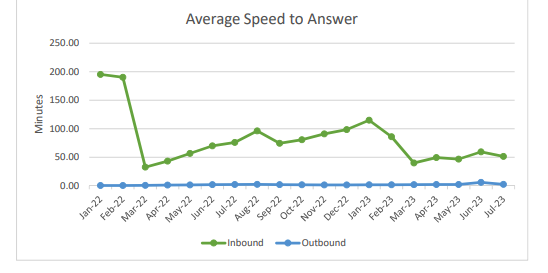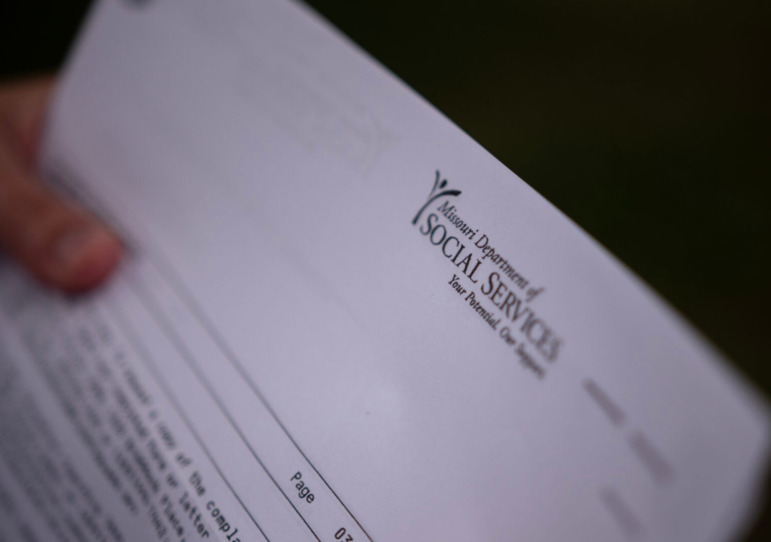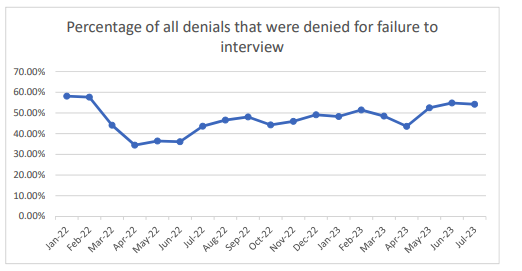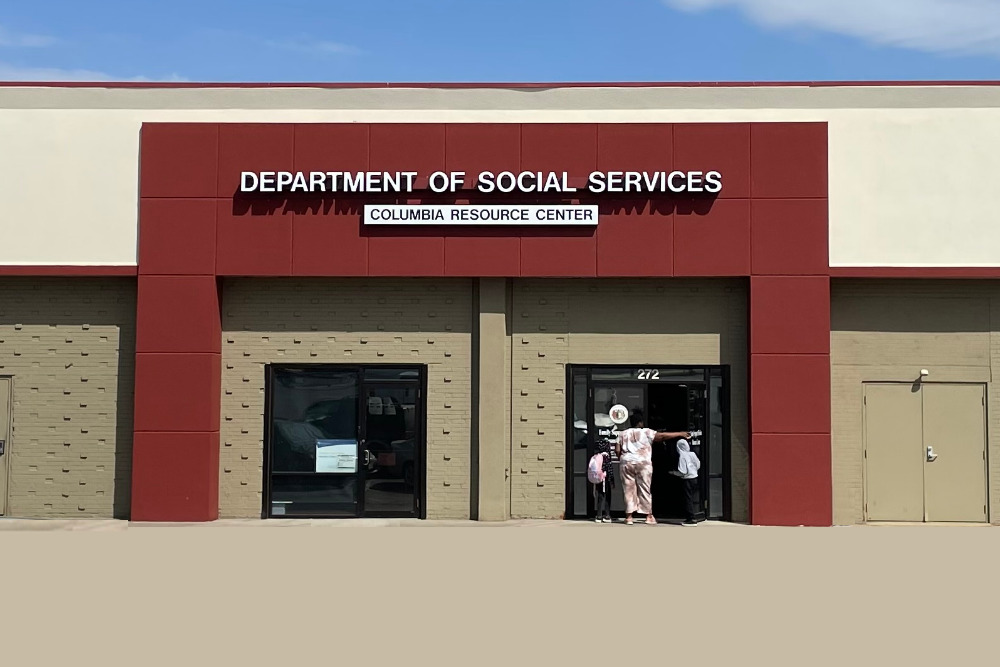Treasure Dowell has called Missouri’s social services department three times a day for nearly a month and has yet to speak to a human being.
Sometimes she is automatically disconnected hours before the call center closes because it has reached capacity for the day. Other times she waits hours, her phone on speaker atop the kitchen counter, playing the hold music and occasional queue updates, while she watches her kids, only for the line to disconnect.
When she hears that the queue numbers in the hundreds, she usually hangs up and tries again later.
At stake is the $1,339 in monthly food benefits she relies on to help feed her five children — three of whom are special needs and have restricted diets.
“I’m scared I’m not going to be able to afford food,” she said.
An in-person or phone interview is required to enroll or be re-certified in the Supplemental Nutrition Assistance Program, formerly known as Food Stamps — a federal program administered by the states that provide grocery benefits to low-income people.
Dowell has struggled to find child care that would allow her to drive to the nearest resource center, which is more than 20 minutes away and she is hesitant about bringing her kids — four of whom are under the age of five.
Without getting through the call center for an interview, Dowell couldn’t be re-certified when her case came up for renewal in September and she lost the benefits she would’ve received in October. She submitted a new application but didn’t get through for an interview in October either.
“It’s very upsetting,” she said. “The point is for help to be available.”
“I understand waiting a little bit but people who work normal jobs can’t wait on hold for four or five, six hours.”
Missouri’s troubled call center became the subject of a federal lawsuit in February 2022. The lawsuit, which is ongoing, alleges that barriers to obtaining a SNAP interview, primarily because of the state’s “dysfunctional” call center, violate federal law and deprive eligible Missourians of benefits.
Those barriers — including the system automatically hanging up on people before they get through and long wait times which lead people to abandon the calls — have persisted, data obtained in discovery and published in court filings shows.
One of the attorneys representing the plaintiffs suing the state, Katherine Holley, senior attorney at Legal Services of Eastern Missouri, said 20 months into the litigation the state still has “extreme access problems.”
“[The Department of Social Services] has been on notice for quite a while that these problems are going on,” Holley said. “And it’s a shame because that means people who are doing everything that they can to get SNAP are not getting them.”
‘At the mercy of a broken system’
In the federal lawsuit, plaintiffs argue the state is denying benefits to eligible low-income Missourians, along with failing to provide reasonable accommodations to those with disabilities to apply. The lawsuit asks the court to order the social services agency to make procedural changes that would bring the state into compliance with federal law.
Plaintiffs describe subsisting on little food while using up prepaid phone minutes waiting on hold for an interview, and, due to disability, struggling to understand the application forms but being unable to get through the call center for help.
Those plaintiffs eventually received benefits after the litigation was filed, but they argue they’ll be at the “mercy of [Department of Social Services’] broken, unlawful system” once their yearly renewals come up.
Callers to the state’s SNAP interview phone line waited an average of 51 minutes before being connected to a representative, according to the most recent data, from July.
And that’s evidence of improvement, the state has argued: The agency has made “significant strides to make interviews more widely available and reduce wait times,” an attorney for the Department of Social Services wrote in an October filing.
The average wait time has ranged from around 30 minutes to three hours since January 2022.

Screenshot courtesy of legal filing
The wait times are down from their peak at over three hours in early 2022, but still hovered around 50 minutes in recent months.
U.S. District Court Judge M. Douglas Harpool last year called a wait time of 56 minutes “still unacceptably long and particularly burdensome for financially struggling Missouri citizens in need of SNAP benefits.”
The wait time provides only part of the story: Many, like Dowell, don’t make it through to a representative at all.
Some callers to the state’s SNAP interview line are immediately rejected because the center stops accepting calls when it calculates that, with the wait times and queue, additional calls cannot be answered during the remaining business hours.
Dowell said she has experienced that automatic rejection, usually when she calls sometime after noon, around 3 or 4 p.m. — an automated message plays a list of suggestions, including to visit a resource center or the state’s website, then disconnects. (The call center officially closes at 6 p.m.)
Fifteen percent of all calls in July were automatically disconnected for that reason, or 64,053 calls, according to data obtained in discovery and laid out in a September filing.
Those who do make it through to join the queue often do not have the time to wait.
Nearly one-third (32%) of those in the queue in July abandoned their calls before being connected to someone, and they waited an average of 21 minutes.
Dowell said she has “sat on hold until they closed” before, waiting over two hours just to be disconnected.
Without interviews, SNAP applications and renewals are automatically denied after 30 days — even if applicants have tried and been unable to get through.
Around half of all SNAP denials in the state are due to failure to complete an interview, according to data obtained in litigation.
The state has previously said wait times are lower when applicants answer the state’s call made from an automated system for an interview. But the state usually only makes one such call.
And according to the federal lawsuit, those calls are “inconsistent,” and applicants often miss them because they do not know when to expect them, at which point they must go to an in-person office or use the call center.
Using the state’s in-person resource centers, plaintiffs argue, is also not a solution for many of the call center users because many offices already have limited staffing that couldn’t “handle the additional demand of numerous SNAP applicants,” plaintiffs wrote. Some have inconsistent and limited hours: Thirteen resource centers in the state have only one staff member, for instance, according to a late-October filing, limiting hours and availability. And many applicants or participants may lack transportation or be unable to go in person due to disability, plaintiffs argue.
‘Each applicant’s responsibility’

Annelise Hanshaw/Missouri Independent
Missouri Social Services application form.
Harpool is now considering a motion for summary judgment, meaning discovery is complete and he will decide whether any or all of the issues can be resolved without a trial.
A trial is scheduled for early next year.
The Department of Social Services did not respond to a request for comment or for call center data since July.
In court filings, the state has argued they’ve made substantial efforts to remedy the call center issues, which it says arose from staffing issues during COVID.
Those efforts include attempts to hire and train more staff and provide overtime, use outside vendors to handle Medicaid calls so more workers are free for SNAP interviews and create a scheduling system. The state is in the process of creating a virtual interview program but hasn’t provided a timeframe for its completion.
The plaintiffs’ lawyers call those efforts “meager,” and say the data shows there are still high rates of rejection born out of failure to complete an interview.

Screenshot courtesy of legal filing
Around half of all SNAP denials are because the person failed to complete an interview.
The efforts “do not solve the persistent dysfunction in [the state’s] SNAP operations,” the plaintiffs’ attorneys wrote. The agency “has not changed any of the systemic flaws that resulted in Plaintiffs’ inability to complete the eligibility process.”
“Ultimately,” the attorney general’s office, which is representing the department, wrote in an October filing, ”it is each applicant’s responsibility to follow program rules for interview completion” — pointing to examples where the plaintiffs disconnected rather than continued to wait on the line.
Piecemeal relief
On Thursday — after trying to secure an interview since September, and ramping up her calls to several times a day the last few weeks — Dowell finally received an interview. She said she was approved for benefits.
But it wasn’t because she got through the phone line herself: Holley, one of the attorneys in the federal lawsuit, stepped in to help.
Early in federal litigation, the Department of Social Services and Legal Services of Eastern Missouri agreed to set up a system so that Holley could refer clients facing interview hurdles to a quicker path to an interview. Holley said the goal was to ensure the attorneys didn’t have to keep adding plaintiffs to the case.
Holley made a referral that allowed Dowell to schedule an interview appointment within days.
Dowell has been “very frugal,” she said, limiting her driving and restricting purchases to the necessities, but she is “down pretty close to 80 bucks.”
“So it will be a tremendous help to me and the kids,” she said.
Two of her kids have been diagnosed with autism and only eat a few foods, like chicken nuggets, crackers and tater tots, “so being able to buy things that fit into their realm of foods that they eat — that there’s no texture aversions to — will be a big relief,” Dowell said, adding that those are “not cheap items.”
Without the referral, Dowell said, November would be the third month of “going through this exact same thing.”
Community organizations also refer clients to Holley for expedited assistance.
But the piecemeal approach is not a systemic solution, said Christine Woody, food security policy manager at Empower Missouri, a nonprofit advocacy organization that’s also a plaintiff in the lawsuit. She has referred several people to Holley in recent months.
“It’s great that we have a direct line to someone that can help,” Woody said, “but that’s not changing the process for the thousands of other people.”
“That’s not the answer.”
***
Clara Bates covers social services and poverty. She previously wrote for the Nevada Current, where she reported on labor violations in casinos, hurdles facing applicants for unemployment benefits and lax oversight of the funeral industry. She also wrote about vocational education for Democracy Journal. Bates is a graduate of Harvard College and a member of the Report for America Corps.
Missouri Independent is part of States Newsroom, a network of news bureaus supported by grants and a coalition of donors as a 501c(3) public charity. Missouri Independent maintains editorial independence.






























